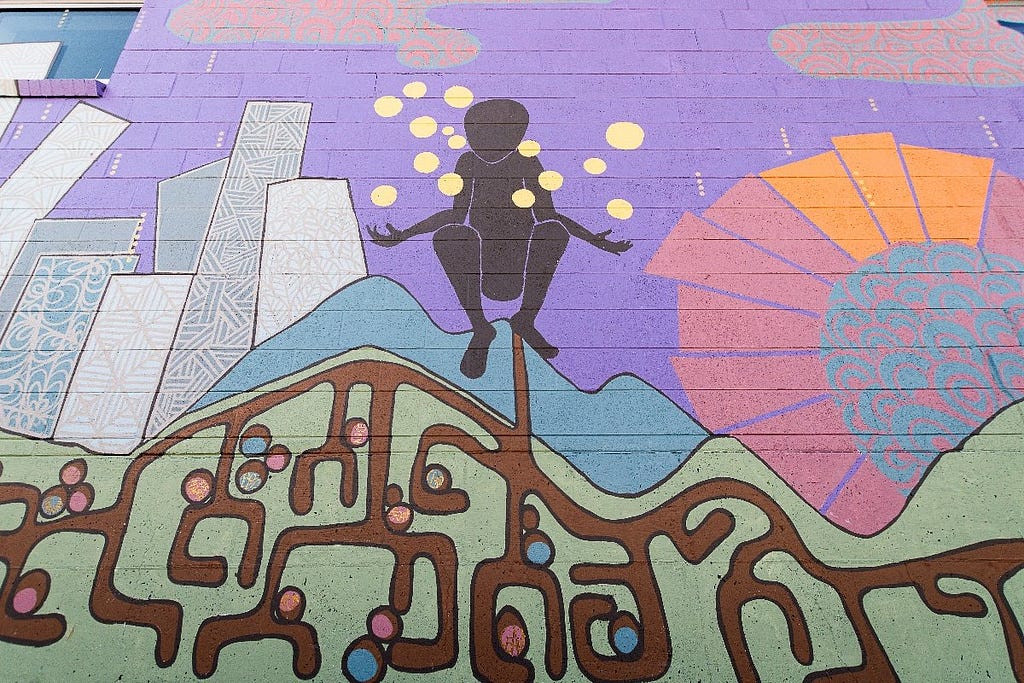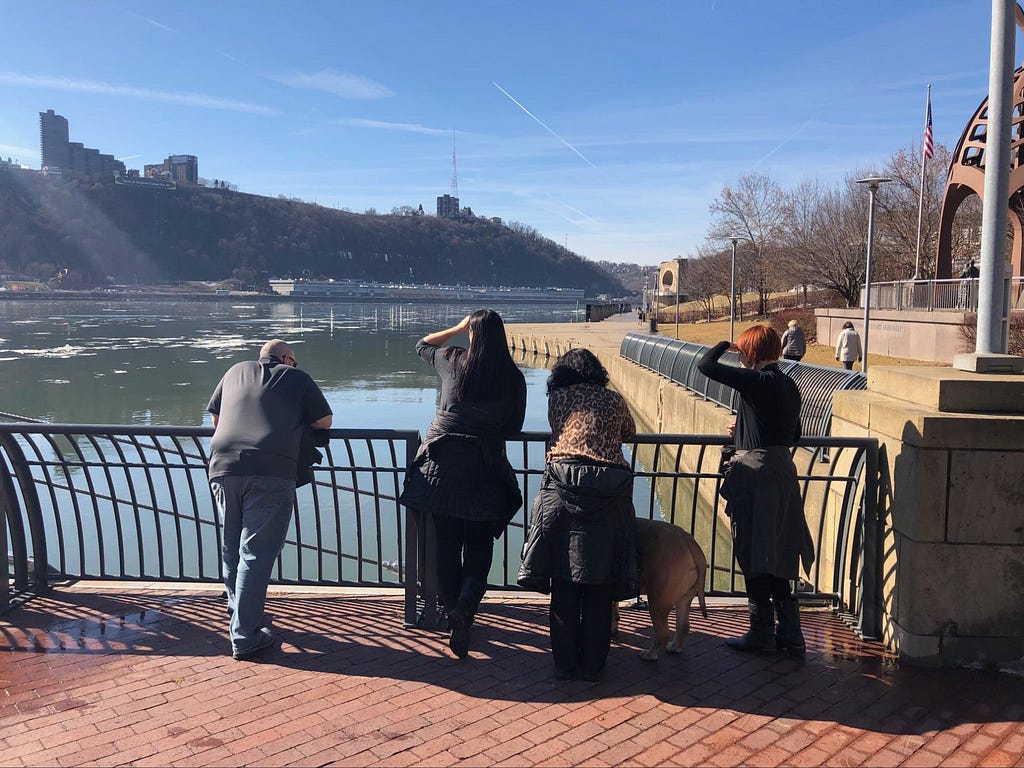Examples of Employee-Led Initiatives to Increase Positive Impact

Taz Romine-Mann is a co-owner and fleet and facilities supervisor at Namasté Solar, an employee-owned Certified B Corporation based in Colorado. Since 2018, when the predominantly white company moved its Denver office to the racially diverse Sun Valley neighborhood — one of the poorest neighborhoods in the state — Romine-Mann has been regularly attending meetings of the Sun Valley Community Coalition, the registered neighborhood organization.
Romine-Mann recalls that there were concerns at the company whether the company would be able to integrate into the neighborhood. One of the impact strategies he and others considered was letting community members use part of the Namasté Solar building for a mural. The idea resurfaced when Romine-Mann met Annie Phillips, a community outreach team member for Meow Wolf, at one of the community meetings. Meow Wolf is also a B Corp and creates immersive art installations — a natural fit for the project.
The mural was created with, by, and for the kids who live in the Sun Valley neighborhood as a community activity. Once the mural was completed, Namasté Solar and Meow Wolf partnered with members of the Sun Valley community to create an unveiling event, called Art + Sol, to showcase the mural and continue to involve the community.
This collaborative, community-building project was spurred directly by an engaged employee committed to the mission of the company where he works. Without Romine-Mann and Phillips’ effort to engage the community outside of their “regular” work duties, the mural likely would never have happened. And the goodwill in the neighborhood might have stalled without an employee regularly attending neighborhood meetings while hearing and considering what the people who live there have to say.

These types of examples highlight a company’s most valuable tool for successfully implementing impact strategies: the team of people who show up to work. We gathered stories from across the B Corp community through the B Hive to hear about employees who go the extra mile to have a positive impact.
Employee-Led Impact Strategies
Voluntary Sustainability KPI program at MaCher
Genevieve Lawrence, sustainability director at sustainable design firm MaCher, set up a voluntary Sustainability Key Performance Indicator (KPI) program that over the past year had 100% participation from its 28 employees. The program is aimed at helping MaCher achieve its company sustainability goals and UN Sustainable Development Goal (SDG) commitments. Here’s how it works: Each team member chooses an area of interest from MaCher’s sustainability report and creates an individual KPI based on personal passion and skillset to contribute to progressing the B Corp’s overall goals. “We have had a huge variety of topics covered and improvement in our impact based on each team member’s chosen area of contribution,” Lawrence says. She shares the following examples:
- Products designer Brittney Lewis chose to focus on improving diversity in the outdoors. She provided an educational workshop to the MaCher team and has since progressed into working with clients in the travel industry who want to be involved in furthering the initiative. She also created a meetup group to take women of color on guided hikes near the company’s hometown of Los Angeles. Some participants said they always wanted to do a hike but were too afraid to go by themselves and were thankful she provided a space for them to participate.
- Account manager Richard Flores opted to reduce waste and single-use plastics from the MaCher supply chain. He has been working with suppliers to reduce the amount of polybags used for orders and to find alternative replacement materials to virgin materials. Through conversations with clients and supply partners, he has already significantly reduced the volume of polybags by converting most orders to bulk polybags rather than individual polybags. He is also currently working to have a major client switch materials from virgin materials to recycled materials.
“We have had a huge variety of topics covered and improvement in our impact based on each team member’s chosen area of contribution.”
Social and Eco Project Leadership
JoAnn Rizzo, eco chair at AE Works, a building design and consulting firm, says employees are encouraged to take initiative and lead what AE Works calls “Social and Eco Projects.” Some examples of these employee-led activities or involvement Rizzo shared include:
- Veterans Leadership Program
- Tree of Life Blood Drive
- Get the Funk Out of February
- Sustainable Pittsburgh Challenge
- Reclaim Events
To get a taste of what one of the above initiatives was like, Rizzo shared more details about the Get the Funk Out of February event series. “This event was initiated and coordinated by one of our interior designers, Megan Carleton, because February is one of the dreariest months in terms of weather. With the help of a few other employees, they planned a month of activities to get staff on the road to health and wellness,” Rizzo says. These activities included lunchtime walks (with an alternate route indoors when the weather was bad); an essential oils presentation on the connection between essential oils and mental well-being; lunchtime BodyFlow class; 15-minute guided meditation on Mondays; and even a “Guac Off” on the last day of the month when participants bring in their signature homemade guacamole and the team samples and votes on the favorite.

Denver Public Schools CareerCoach Mentor Program
Arthur Hicks, a Namasté Solar co-owner, channeled his passion for teaching to create a partnership between the company, Denver Public Schools, and the school district’s CareerCoach program that gives students the opportunity to learn more about future career paths, such as the solar industry. His endeavors even led Namasté Solar to receive the CareerCoach 2018 Partner of the Year award.
In the 2018–2019 school year, Namasté Solar employees mentored 13 high school students through the CareerCoach program by contributing 312 hours of company-paid volunteer time. With the internship-based CareerConnect program, Namasté Solar hosted three interns over three semesters who have been doing real-life solar PV designs for new construction communities across the nation. The interns completed over 150 designs that will be realized as installations in Colorado, California, and Nevada. To date, Hicks and his colleagues have mentored about 45 students, volunteering nearly 1,000 hours over the last three years.
Setting Goals Around Improvement on the B Impact Assessment
Beneficial State Bank Vice President Craig Hill, who also serves as the Certifications Chair for B Local PDX, shares that Beneficial State is “working to engage all our stakeholders in metrics-focused and community-driven groundswells for impact and positive social change. Equipping our staff to better talk about what it means to be a B Corp and how our B Impact Assessment score at Beneficial State was measured is one major portion of that focus.”

Hill says the bank’s branches hold a regular series of all-hands calls to dive into each area of the B Impact Assessment and what exactly each point of the score constituted in terms of a commitment from the bank and its operations. By diving into the score and how it’s achieved, Hill says the bank has seen employees begin to analyze the points Beneficial State currently doesn’t have and develop impact strategies to start collectively working toward improving those areas of impact. “This engagement effort drives employees of all pay grades, seniority, title, and geographic location to take ownership of our score and therefore our impacts, and help develop new ways we can implement positive change throughout our organization,” Hill says.
One example: Employees at branches in the Central Valley of California who heard about Beneficial State’s at-work composting systems in other markets — systems that were developed as part of the bank’s B Impact Assessment — worked with their local cities to push for at-work composting and more robust recycling programs.
Mental Health and Well-Being Resources
At Ellevate Network, a company focused on supporting and developing women leaders, Operations Lead Sam Giannangeli shares that a group of employees championed open communication and companwide resources on mental health. Ellevate hosts regular “community hours,” Giannangeli says, when employees can come together and discuss what’s on their mind, from current affairs to holiday stressors to balancing complex workloads. Last year, when the company hosted a community hour focused on mental health at work, the team came away with information to create an entire employee-written resource to share, as well as a new, live resource: a voluntary Slack channel dedicated to mental health.
“It may sound small, but it’s among our most active channels, and it bridges the gap between our remote and in-office employees. It’s a place to go for peer support, to share resources, and to talk openly and without stigma about how we’re feeling,” Giannangeli says. “We’re fortunate to operate as a small, agile company. When someone has a good idea, we’re able to act on it for the benefit of our entire team.”
Brown Bag Lunch Meetings
Lindsey Bolton, sales and marketing coordinator at herbal-products company All Good, is engaged in multiple initiatives to help improve her company’s inclusive practices and climate impact. Bolton participated in B Lab’s Inclusive Economy Challenge Peer Exchange and is involved in the JEDI Collaborative, which is put on by OSC2, a Northern California and national community of sustainably focused natural product industry CEOs and business leaders. “The JEDI Collaborative is a series of workshops focused on Justice, Equity, Diversity and Inclusion. Because this is a topic that a coworker and I were interested in learning more about, we took initiative with the support of our CEO to join the workshop series to bring sensitive and valuable topics to our whole team,” Bolton says.
Bolton is not alone as an employee leader at All Good: This year, the company started a weekly office lunch meeting where team members have the space to present on a topic that is important to them regarding sustainability, activism, social justice, climate change, and more. “The idea behind this is to give employees a platform to share and engage and inspire our team to adopt new practices or try new approaches both in and out of the workplace,” Bolton says.
B the Change gathers and shares the voices from within the movement of people using business as a force for good and the community of Certified B Corporations. The opinions expressed do not necessarily reflect those of the nonprofit B Lab.

Impact Strategies: What Every Employee Can Do to Make a Difference on the Job was originally published in B The Change on Medium, where people are continuing the conversation by highlighting and responding to this story.